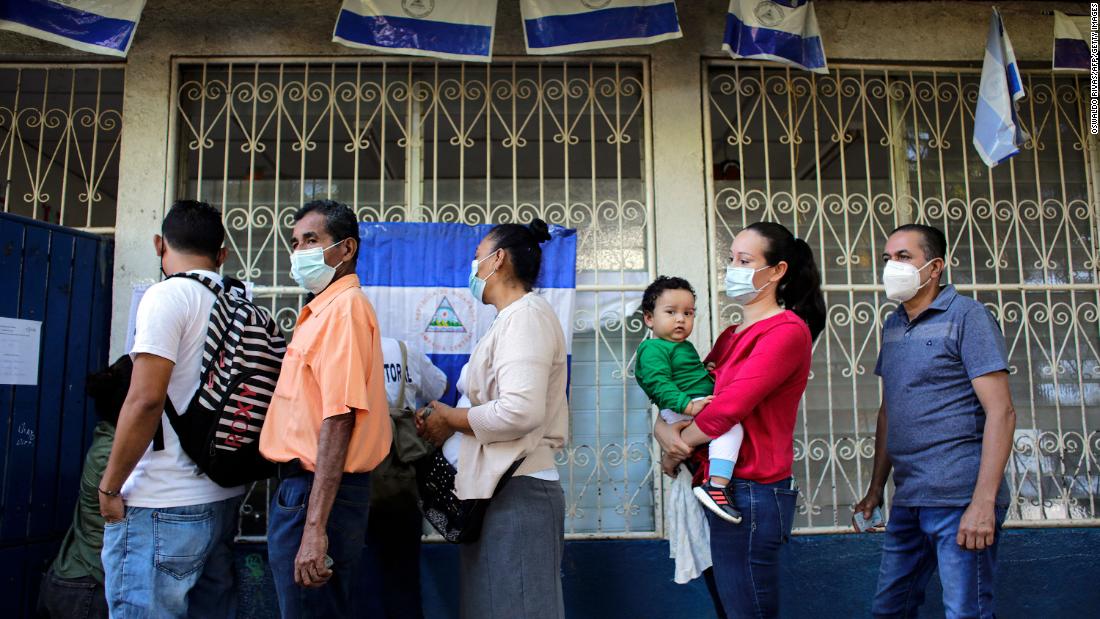Nicaragua votes in elections panned as ‘parody’ by international observers
According to Nicaraguan state media, voters turned out across the country to cast their ballots for president and members of the national assembly. “Massive participation in all the municipalities,” reported government-run outlet El 19 Digital, which described long lines conducted in “order, peace and tranquility.”
However, several Nicaraguans interviewed by CNN painted a different picture.
“Going to vote is a joke,” a high-ranking clergy member of the Catholic Church in Nicaragua told CNN by text message. “The people are fearful and locked in their houses.”
“A lot of the people I know are not leaving their homes,” said another Nicaraguan in the city of Granada, asking to remain anonymous for safety reasons. Driving through town, the streets and polling stations he saw were empty, he added.
During a press conference alongside Murillo in the capital Managua on Sunday, Ortega described voter participation as a “vote for peace.”
“We have a right, as Nicaraguans, to open investigations against terrorists and defend the peace,” he also said, apparently defending the dozens of arrests of government critics that had preceded the election.
An empty field
At least half a dozen likely presidential contenders were detained ahead of the vote, clearing Ortega’s path to another five years in office. Though five other presidential candidates were listed on the final ballot Sunday, none are seen as strong challengers.
Dozens of other prominent critics and opposition leaders were also detained and investigated for alleged national security concerns, according to Nicaraguan law enforcement — moves that much of the international community has criticized as political repression.
‘A parody of an election’
The Ortega government’s tactics to stifle competition have prompted condemnation from democratic governments and members of the Nicaraguan diaspora around the world.
At a protest in the Costa Rican capital San José, dozens of demonstrators dressed up as clowns to indicate their claim the elections in Nicaragua were a “circus.” “This is fraud. I’m dressed as a clown because this vote is a joke,” one female protester, who did not identify herself due to fear of repercussions, told CNN en Español.
In Miami, Florida, protesters carried blue and white Nicaraguan flags and signs reading “no to electoral fraud” in Ruben Dario Park, named after the Nicaraguan poet.
And in Madrid, Spain, protesters gathered outside the country’s congressional building carrying a large sign reading “Nicaragua: justice and liberty,” demanding the results of the vote be rejected.
Regional governments have long voiced concern over the Ortega regime’s crackdown over the past year. Following a wave of arrests this summer, Mexico and Argentina recalled their ambassadors for consultations, citing “worrying legal actions by the Nicaraguan government.”
“The event that’s about to take place on November 7 is a parody of an election,” echoed Canadian representative Hugh Adsett.
A day earlier, on November 2, the European Union’s chief diplomat, Josep Borrell, described Nicaragua’s election as so “completely fake” that it would not be worth sending independent observers.
“We are not going to send any electoral observation mission there because Mr. Ortega has taken care to imprison all the political contenders who have stood in these elections,” Borrell said, speaking in Lima, Peru.
Ortega and Murillo’s tightening grip on power
Ortega came to power as part of the Sandinista rebels who overthrew the Somoza dynasty in 1979, and fought against the US-backed Contras during the 1980s. First elected in 1985, he has since demolished Nicaragua’s presidential term limits, allowing him to run over and over again.
Over the years, the pair have inexorably consolidated power, appointing loyalists to top government roles and exerting an increasingly tight grip on the country’s social and political spheres. Local press describe a climate of fear and intimidation.
“They’re fearful of losing their grip on power,” said Julie Chung, the acting Assistant Secretary for the US Department of State’s Bureau of Western Hemisphere Affairs, in June. “As such, that fear of democracy, I think, has contributed to triggering these kinds of actions, repressive actions, because they have no confidence in their own ability to have the people support them.”
Pro-government armed groups arbitrarily detained hundreds of participants, attacked churches and universities where demonstrators were thought to be hiding, and allegedly blocked the injured from accessing medical care.
At least 322 people were killed then, according to rights groups, with thousands injured and hundreds detained. At the time, UN human rights experts accused the government of human rights violations against protesters. Ortega said the UN report was “nothing more than an instrument of the policy of death, of the policy of terror, of the policy of lying, of the policy of infamy.”
Anti-government protests were subsequently banned. Even waving the country’s flag in public — a key symbol of the 2018 demonstrations — was criminalized.
Today, civic participation feels pointless, one young woman told CNN on Sunday.
“Years ago during elections, there were lines at the polls and people wanted to participate,” she said. Though she had boycotted the vote, she pointed out that others in Nicaragua are not free to do even that, with government employees under particular scrutiny.
“My father works for the state and if he doesn’t vote, he’ll be fired. It’s a way to force people to vote, it’s not voluntary,” she said.
Her only hope is to leave the country, she added. “I don’t see a future here. Unless Daniel Ortega and that woman die, nothing will change. There is no life here.”
Previous reporting contributed by CNN’s Flora Charner, Taylor Barnes, Claudia Rebaza, and Matt Rivers.
For all the latest world News Click Here

